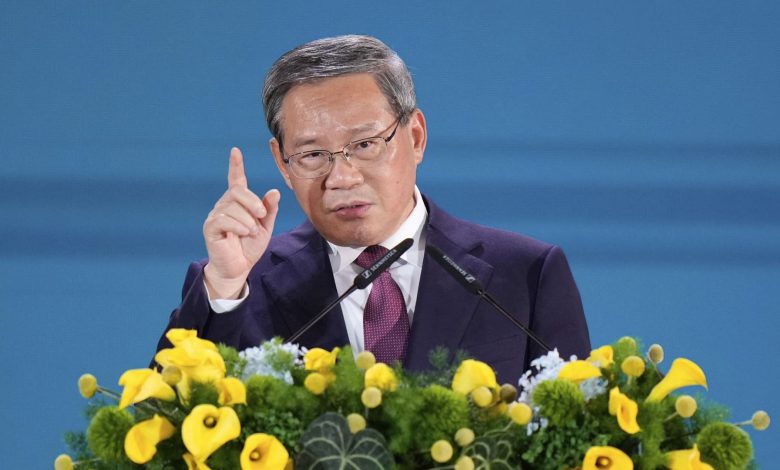China’s premier urges tighter price oversight as deflation pressures mount

TOPSHOT – China’s Premier Li Qiang delivers his speech during the ASEAN – Gulf Cooperation Council (GCC) – China Economic Forum official dinner after the 46th Association of Southeast Asian Nations (ASEAN) Summit in Kuala Lumpur on May 27, 2025.
Vincent Thian | Afp | Getty Images
Chinese Premier Li Qiang has called for tighter pricing regulation in the electric car sector during a high-level meeting Wednesday, as Beijing sought to rein in the cut-throat price wars that are fueling deflationary pressures in the economy.
In singling out the country’s electric-vehicle sector, Li urged strengthened cost oversight and price monitoring. He also called on major automakers to make timely payments to suppliers while practicing greater self-discipline in setting prices.
Automakers should improve their competitiveness through technological innovation and quality upgrades, Li said.
The long-simmering concerns about oversupply and bruising price wars have come to the fore, with Chinese policymakers taking aim at what was described as “involution” — the fierce but often destructive competition — particularly in sectors saddled with surplus capacity, such as EVs, solar panels and steel bars.
In a sign that the intensifying price wars have taken a toll on businesses, China’s industrial profits plunged 9.1% in May. Its factory-gate producer prices also slipped by 2.8% in the first six months of the year from a year ago, official data showed.
Even though profits for Chinese carmakers dropped 11.9% year over year in May, car sales in the country rose 11.7% during the same period, according to the China Association of Automobile Manufacturers, with over half of them being new energy vehicles.
The auto industry association in May called to halt the “vicious competition,” which it said has bitten into businesses’ profitability and threatened the security of the supply chain.
Sluggish consumer demand has also strained profit margins for businesses. Li also called for renewed efforts to boost domestic consumption, remove “unreasonable restrictions that thwart household spending” and optimize policies for a consumer goods trade-in program.
The National Statistics Bureau’s deputy head Sheng Laiyun said at a press briefing Tuesday that there has been progress made in the solar panel, cement and automobile industries in easing such price cuts without government intervention.
Not cutting back
Even as China shifts its policy messaging to tackle the price wars, economists pointed out that Beijing needs to balance the task of curbing excess supply without stalling growth or putting jobs at risk, especially as an intense trade war with the U.S. has cast doubts over external demand for its goods.
Economists at Nomura Bank suggested that attempts to address the surplus capacity would involve substantial production cuts for manufacturers that have been selling products at a loss.
However, curbs on investment flowing into the industrial sectors and production outputs would likely generate an additional drag on the economy.
“Production cut inevitably comes at the cost of growth and jobs,” said Neo Wang, lead China economist and strategist at Evercore ISI, suggesting Beijing is unlikely to meaningfully cut back capacity.
“Ensuring growth and saving jobs are of higher priority to Beijing than correcting disinflation or deflation,” Wang added, stressing that “the voices so far sound like a slogan for a short-lived campaign at best, rather than a prelude to any reform,” Wang added.
China reported Tuesday that its economic growth beat expectations, expanding 5.2% in the second quarter, putting the country on track to meet its official full-year growth target of 5%.
While some companies across various industries have reportedly planned to cut output, it may not translate into a broader supply drawback, said Tianchen Xu, senior economist at Economist Intelligence Unit.
“There are always people who want to expand their market share with low price. Even if a price alliance is formed, firms can still betray the alliance and undercut competitors,” Xu said.




